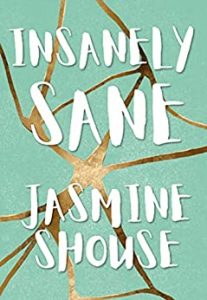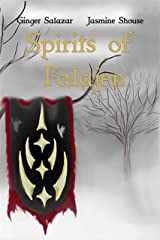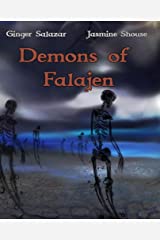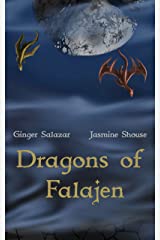Anxiety and an Active Imagination: An Interview with Jasmine Shouse
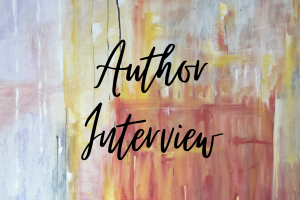 The topic of mental health is important to me, and novels are one of the best ways to highlight the significance of good mental health support and educate readers. Author Jasmine Shouse is intimately familiar with the world of mental health, and she’s used her experience to help craft her most recent book, Insanely Sane, which released from Motina Books on May 24. Jasmine isn’t afraid to speak boldly in her work, and one Goodreads reviewer wrote of the book, “Raw and unfiltered. I appreciate the diversity and understanding [the author] shows of various mental health issues.” Another reader said, “Real. Raw. Challenging. Three words that I would use to describe this book. She addresses mental health and trauma without stigmatizing or backing away from the uncomfortable.” In this post-pandemic world, we need to push some boundaries, talk about mental health whether or not it makes us uncomfortable. Reading and recommending books like Insanely Sane can be the first step. A former member of the Navy, Jasmine “served as a linguist and cryptologist,” but now spends time writing, gaming, and parenting, among other things. Many thanks to Jasmine for taking the time to answer my questions and for being so forthright with the readers.
The topic of mental health is important to me, and novels are one of the best ways to highlight the significance of good mental health support and educate readers. Author Jasmine Shouse is intimately familiar with the world of mental health, and she’s used her experience to help craft her most recent book, Insanely Sane, which released from Motina Books on May 24. Jasmine isn’t afraid to speak boldly in her work, and one Goodreads reviewer wrote of the book, “Raw and unfiltered. I appreciate the diversity and understanding [the author] shows of various mental health issues.” Another reader said, “Real. Raw. Challenging. Three words that I would use to describe this book. She addresses mental health and trauma without stigmatizing or backing away from the uncomfortable.” In this post-pandemic world, we need to push some boundaries, talk about mental health whether or not it makes us uncomfortable. Reading and recommending books like Insanely Sane can be the first step. A former member of the Navy, Jasmine “served as a linguist and cryptologist,” but now spends time writing, gaming, and parenting, among other things. Many thanks to Jasmine for taking the time to answer my questions and for being so forthright with the readers.
Christina: Congrats on the recent publication of the Young Adult novel Insanely Sane. What inspired the book?
Jasmine: Thank you! I wrote the first draft at fourteen years old. Then, at twenty-nine, I was hospitalized for being a suicide risk. Coming out of that, I rewrote the story with an emphasis on the initial healing that comes from being in the hospital. There’s a lot of negative stigma around being in mental health wards, both surrounding the patients and the hospital itself. I wanted to show that, while hospitalization can be necessary, that doesn’t mean it’s bad. Moreover, everyone’s story is different, but so many of us share the same feelings.
Christina: The novel centers on the stories of characters at the Pleasant Valley Treatment Center, and the book description says, “Trauma is messy. Healing is messier.” What a true statement. Besides using your own experiences, what other research did you have to do with respect to trauma, healing, and mental health in order to accurately portray your characters. Did you find anything surprising?
Jasmine: I wrote this version of the book while I was undergoing intensive trauma therapy, so much of what the counselors and therapists say in Insanely Sane are things my own therapists have said. But I did do research into the parts that I wasn’t intimately familiar with from my own treatment, and some of it is really surprising. For example, 20% of people with bipolar disorder are misdiagnosed. Dissociative Identity Disorder affects roughly 1% of the population, but it still remains one of the least known disorders, and many people still believe it isn’t even real. I also had to research how long it takes for fire to cover a house, which is surprisingly quick (5 to 12 minutes).
Christina: Your other writing tends toward “fanciful realms.” What about writing fantasy is so compelling? Do you think it can do something that other genres cannot?
Jasmine: Fantasy is honestly fun. Anything can be done in fantasy. New worlds are formed every time someone pens a new fantasy story, and there is something incredibly beautiful about that.
Christina: Some of your books are cowritten with author Ginger Salazar. I find the process of coauthoring fascinating. What is your process like when cowriting? Do you find the single author route or coauthoring easier?
Jasmine: Co-writing is a lot of fun. Ginger does an amazing job of coming up with the overarching plot, taking inspiration from her favorite sci-fi shows. I work on the subplots and interweave them with the main plot. We go back and forth to edit and polish each other’s parts. But the best part of it is having someone just as excited about that world’s progress. Co-authoring is easier for me, by far, though I’m extremely lucky to have an incredible co-author.
Christina: You state on your website that you are “THE KIND OF WRITER WHO CAN’T STOP THINKING ABOUT WRITING.” That resonates with me because it 100 percent describes me. What does that mean for you? What does a day in the life look like for you?
Jasmine: I am constantly coming up with stories—the product of anxiety and an active imagination—and some of those end up as stories or at least the start of a story. Elizabeth Gilbert wrote about the idea that creative types have a sort of shared consciousness when it comes to ideas. An idea may attach itself to someone for a while, but, if unused, the idea will move on to another creator or may return another time. I like this concept because it takes the pressure off me to get down all my ideas immediately.
My typical day consists of getting my three boys up and off to school. On a good mental health day, I’ll get some caffeine (chai tea or an energy drink) and settle down to write. Or, more often, I alternate between research and procrastinate by gaming. At some point, my husband reminds me to take a walk or go to the gym. On days my depression and anxiety insist on being present, I spend the day reading or trying to relax.
Christina: I always like to ask about an author’s pets, if they have any. You’ve fostered nineteen dogs and currently have how many? What have you learned from fostering? Can you tell us a little bit about the canine friends living with you now?
Jasmine: I have two dogs, actually! My older dog Zoom is a rescue but wasn’t a foster. Fostering dogs was invigorating. We lived in a neighborhood that was used as a dump zone for discarded fighting dogs or abandoned for other reasons. Dogs hurt by trauma aren’t much different than humans, and Radar was one of those. She had puppies, and her owners kept the puppies, electing to surrender Radar and her sister. I had been out of the hospital for a couple of weeks and needed some way to feel normal again, so I picked them up from San Antonio Pets Alive to foster. Radar’s sister was adopted out almost immediately to a kind man whose two daughters wanted a companion for him. Radar became my shadow, and she helped me readjust. When it became clear she wasn’t going anywhere, she became a permanent part of the family. She’s the perfect little sister to Zoom, the best friend to my youngest son, and a sweet companion to me.
Christina: What is your writing kryptonite?
Jasmine: My writing kryptonite is depression. It gets in the way of almost all functionality when it’s bad, and it takes a long time after I’ve gotten through a depression spell to actually get to writing again because imposter syndrome comes on its tail. I start feeling like my work isn’t good enough, or that I need to scrap it. I’ve been lucky to have some really encouraging friends and a supportive husband to help me get back on track.
Jasmine can be found in multiple places!
Website: https://jasmineshousewriting.com/
Instagram: @jazzyjbox
Twitter: @jazzyjbox
Facebook: @jasmineshousewriting
Thanks to Jasmine for agreeing to this interview! If you know of an author who’d like to be featured in an interview (or you are an author who would like to be featured), feel free to leave a comment or email me via my contact page.

